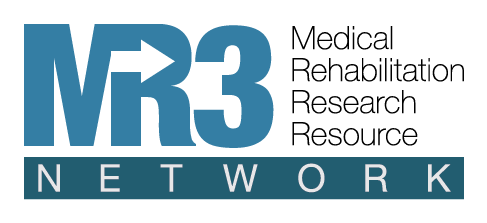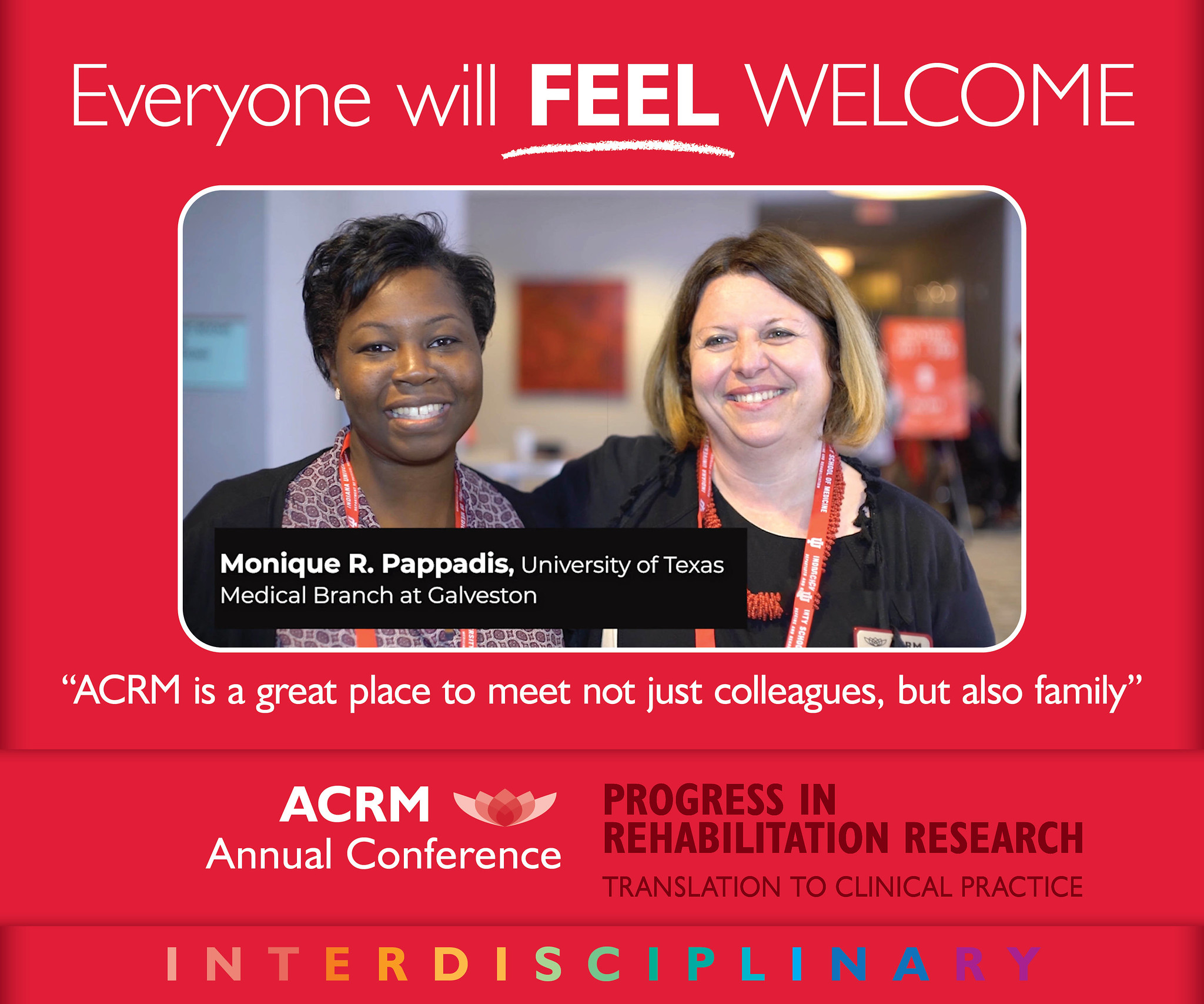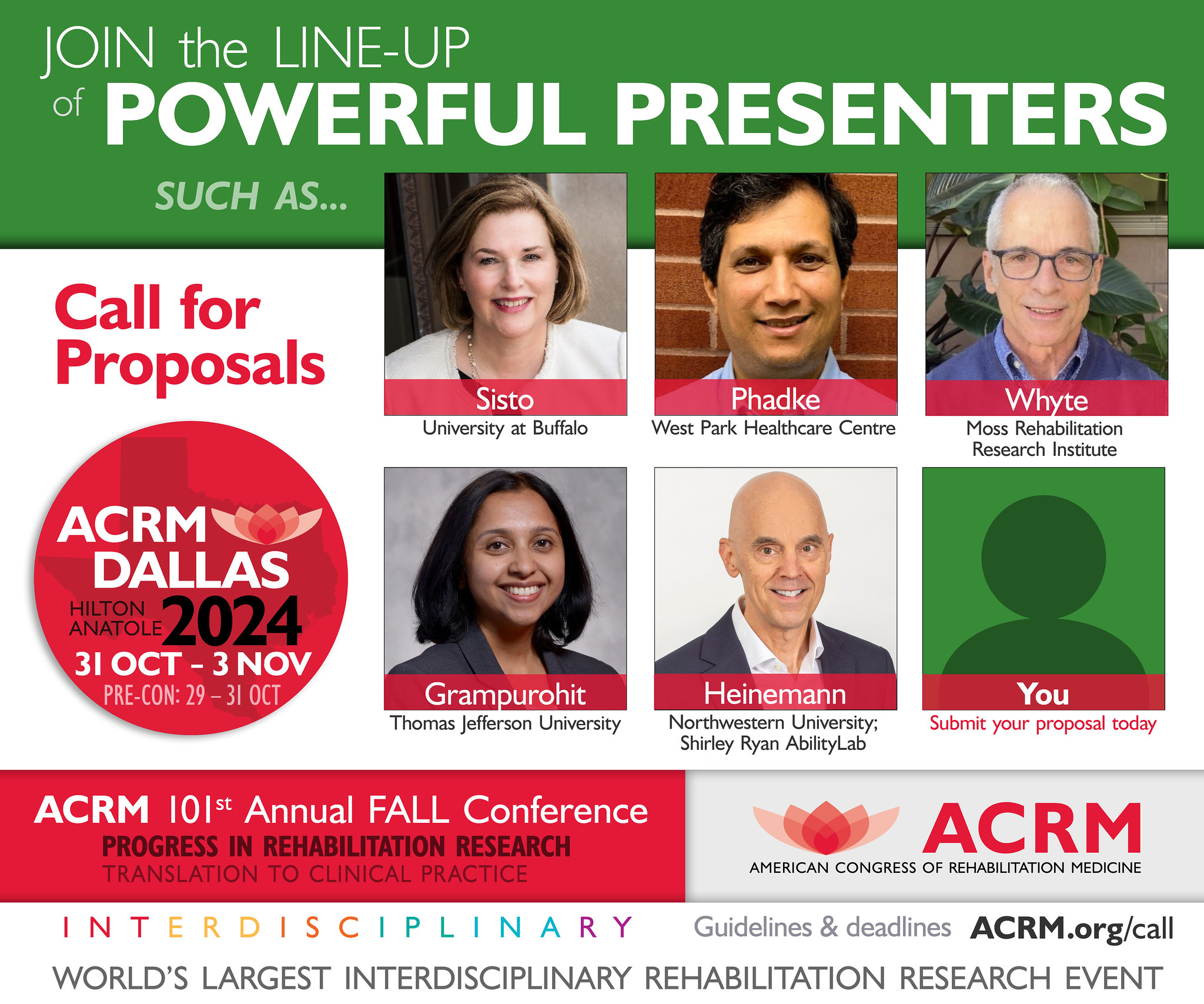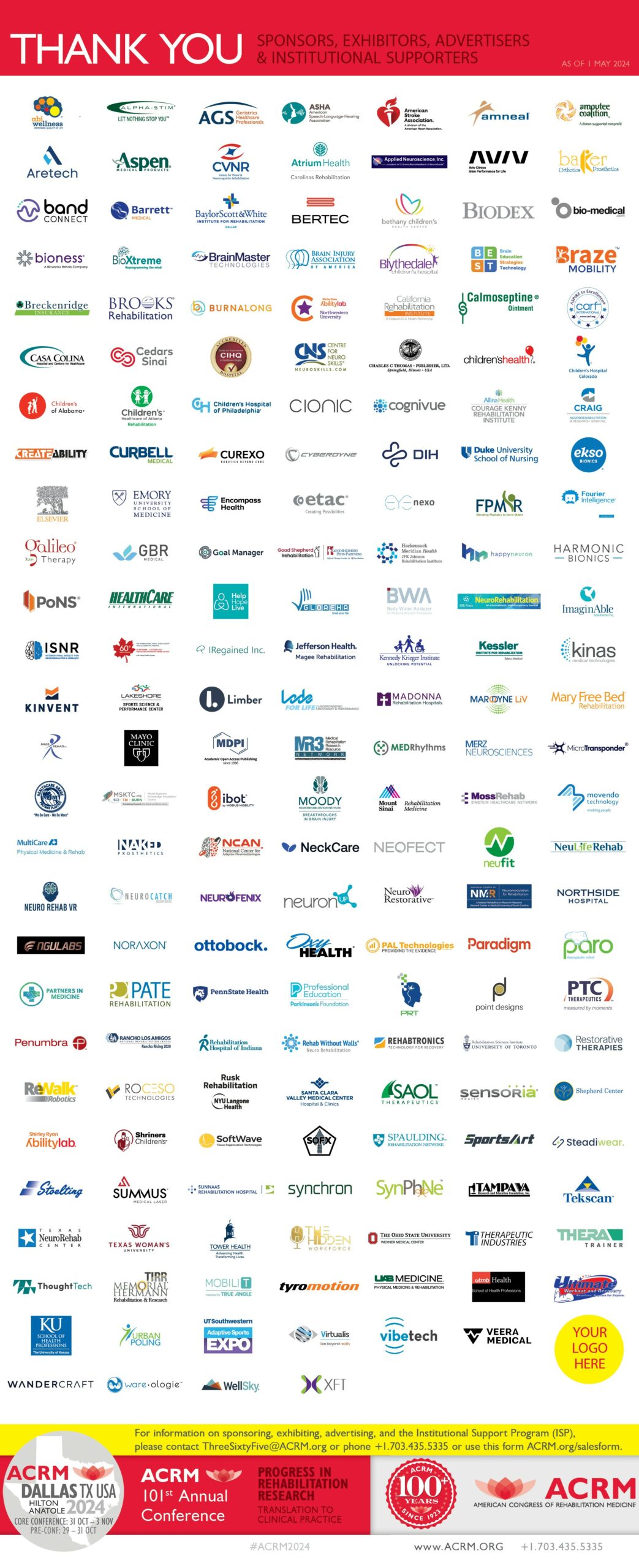Professional Resources
ACRM interdisciplinary special interest groups, networking groups and committees created or compiled the following complimentary resources for use by rehabilitation professionals. Please bookmark this page and visit often.
APHASIA & RELATED DISORDERS
Resource Database for Aphasia & Related Disorders
This database was compiled by the Stroke ISIG Aphasia & Other Communication Disorders Task Force to connect professionals, medical professionals, and individuals with aphasia and their communication partners with resources that are available in many locations on the Internet. Topics cover general information, to specific therapy resources, to tools that can be used by clinicians and families to improve the lives of individuals with aphasia.
If you are aware of an Internet resource that is not included in this list, please email sraymer@odu.edu and that resource will be added if appropriate.
Academic Teaching Resources for Aphasia >>
Faculty teaching classes on aphasia may find some of these resources useful to include in class lectures and assignments.
Aphasia Friendly Clinical Resources >>
Clinicians who work with individuals with aphasia may find these resources useful to provide written or pictured information that is especially understandable for individuals with aphasia who may have reading and auditory comprehension difficulties.
Bilingual Aphasia Resources >>
Some resources are available to address the unique needs of individuals who are bilingual and experience aphasia in multiple languages.
Children and Aphasia >>
This list consists of resources related to educating children about aphasia and/or children experiencing aphasia themselves.
Family Education >>
This list is prepared for families and friends of individuals with aphasia to connect them to tools, strategies, and training to improve communication with loved ones with aphasia.
General Aphasia Information >>
Many resources are provided that define aphasia and describe the characteristics of aphasia. Some also contrast aphasia with other communication disorders.
Intensive Aphasia Therapy Programs >>
This list connects individuals with aphasia to a variety of intensive rehabilitation programs around the world where language activities take place to overcome the effects of aphasia.
Life Participation Approach for Aphasia (LPAA) >>
This list connects individuals with aphasia to a variety of programs that provide rehabilitation options and engage individuals with aphasia in a variety of enriching and interesting daily life activities.
National Organizations Related to Aphasia >>
Organizations around the world have been created to address the ongoing, persistent needs of individuals with aphasia. Information is provided for individuals with aphasia, their communication partners, and medical professionals who work with individuals with aphasia.
Primary Progressive Aphasia PPA Information >>
Individuals who experience slowly progressive onset of language difficulties are sometimes diagnosed with primary progressive aphasia. This is a listing of resources specially prepared for this unique population. These tools might also be useful for individuals with communication impairments associated with related dementias.
Research/Legal/Ethical Resources >>
Researchers and clinicians who work with individuals with aphasia may find some of these resources helpful to prepare research consent tools and consider options for including individuals with aphasia in research. Connection to current clinical trials for aphasia also is provided.
Supported Communication Strategies for Aphasia >>
Useful for families, friends, healthcare givers, and rehabilitation professionals, these resources provide tips and strategies to improve communication interchanges with individuals with aphasia.
Technology Resources & AAC >>
A number of software programs and applications have been developed to assist individuals with aphasia to achieve their rehabilitation goals and to foster improved communication in their daily lives.
University Clinics >>
University speech and language clinics can be an excellent resource for individuals with aphasia to receive ongoing services. This list offers contact information for University clinics ordered by state.
ARTS & NEUROSCIENCE
MUSIC-BASED INTERVENTIONS IN ICU
Music can be a valuable tool to improve inpatient quality of life. Especially today, as patients are increasingly debilitated and isolated due to COVID-19, the Cognitive Task Force of the Arts & Neuroscience Networking Group wanted to provide evidence-based guidance for implementation of music-based interventions. They reviewed studies of music-based interventions in the ICU and compiled a collection of study summaries detailing several benefits, including lower anxiety and quicker weaning off of ventilators. These summaries were written in plain language to be accessible to the general public as well as seasoned researchers and practitioners. Follow the links below to review each collection of studies.
- Music Intervention Studies Investigating Weaning From Mechanical Ventilation
- Music Intervention Studies Investigating Discomfort or Pain During Procedures
- Music Intervention Studies Investigating Effects on Anxiety and Stress in Critically Ill Patients
- Music Intervention Studies Investigating Effects on Sleep in Critically Ill Patients
- Nature Sound Intervention Studies Investigating the Effects on Anxiety in Mechanically Ventilated Patients
BRAIN INJURY
COGNITIVE REHABILITATION
The Cognitive Rehabilitation Manual: Translating Evidence-Based
Recommendations into Practice is intended for use in clinical practice by all
professionals who provide cognitive rehabilitation to brain-injured patients.
DEFINITION OF MILD TRAUMATIC BRAIN INJURY
The definition was developed by the Mild Traumatic Brain Injury Task Force of the ACRM Brain Injury Interdisciplinary Special Interest Group (BI-ISIG) and was translated into seven additional languages in collaboration with the ACRM International Networking Group.
- English (PDF)
- French (PDF)
- Spanish (PDF)
- German (PDF)
- Russian (PDF)
- Japanese (PDF)
- Chinese, Orthodox Characters (PDF)
- Chinese, Simplified Characters (PDF)
CENTER FOR OUTCOME MEASUREMENT IN BRAIN INJURY (COMBI)
Assessments and scales to determine a patient’s functionality and level of consciousness after brain injury, creating consistency in the evaluation of brain injury rehabilitation and assessment.
COMMUNITY INTEGRATION
The Rehabilitation Research and Training Center (RRTC) on developing strategies to foster community integration and participation (CIP) for individuals with Traumatic Brain Injury (TBI).
TRAUMATIC BRAIN INJURY MODEL SYSTEMS NATIONAL DATA AND STATISTICAL CENTER
The Traumatic Brain Injury Model Systems National Data and Statistical Center
(TBINDSC) located at Craig Hospital in Englewood, Colorado, is a central resource
for researchers and data collectors within the Traumatic Brain Injury Model Systems
(TBIMS) program.
DEFENSE AND VETERANS BRAIN INJURY CENTER
The primary operational TBI component of the Defense Centers of Excellence for Psychological Health and Traumatic Brain Injury.
TRAUMATIC BRAIN INJURY: A GUIDE FOR CAREGIVERS OF SERVICE MEMBERS & VETERANS
EVIDENCE-BASED PRACTICE
EVIDENCE-BASED RECOMMENDATIONS FOR COGNITIVE REHABILITATION
GERIATRIC REHABILITATION
Information for healthcare professional treating older adults with complex, chronic diseases and disorders.
INFORMATION/ EDUCATION PAGES
The ACRM Communications Committee has developed a new feature, Information/Education Pages, which appear in the Organization News section of Archives of Physical Medicine and Rehabilitation.
These fact sheets are printed as tear-out pages. They are designed to provide consumer-friendly information on topics relevant to rehabilitation medicine, including basic background or overview, similar to a Wikipedia entry, or brief how-to suggestions. They are targeted toward people with disabilities, their caregivers, or clinicians; and are designed so that a practitioner can tear out and copy, or download the pages, to make them available to patients and caregivers.
MEMBER RESOURCES
MEASUREMENT
Promotes the science of outcome measure, providing information on medical outcomes research, instruments, and publications.
REHABILITATION RESEARCH
 The Center for Large Data Research and Data Sharing in Rehabilitation (CLDR) supports the development of knowledge and rehabilitation research capacity by increasing the quantity and quality of rehabilitation outcomes research using large administrative and research datasets. The center’s current focus is on data sharing and archiving information from completed rehabilitation research studies, with a long-term goal of helping to create a research environment and culture where rehabilitation scientists will have the skills and knowledge to become significant contributors to the changes in health care policy and practice that are being driven through the use of large data and the unprecedented expansion of health care information that has occurred in recent years.
The Center for Large Data Research and Data Sharing in Rehabilitation (CLDR) supports the development of knowledge and rehabilitation research capacity by increasing the quantity and quality of rehabilitation outcomes research using large administrative and research datasets. The center’s current focus is on data sharing and archiving information from completed rehabilitation research studies, with a long-term goal of helping to create a research environment and culture where rehabilitation scientists will have the skills and knowledge to become significant contributors to the changes in health care policy and practice that are being driven through the use of large data and the unprecedented expansion of health care information that has occurred in recent years.
Kenneth Ottenbacher, PhD, OTR, Principal Investigator
The University of Texas Medical Branch, Galveston (with Cornell University and the University of Michigan)
NIH grant P2CHD065702
 MR3 Network The MR3 Network comprises six resource centers around the United States. These centers provide infrastructure and access to expertise, technologies, and resources from allied fields in order to promote multidisciplinary collaborations, develop research opportunities and enhance the capability of medical rehabilitation investigators to understand mechanisms of functional recovery, develop therapeutic strategies, and improve the lives of people with disabilities.These resource centers are funded by the National Institute of Child Health and Human Development (NICHD), through the National Center for Medical Rehabilitation Research (NCMRR), the National Institute for Neurological Disorders and Stroke (NINDS), and the National Institute of Biomedical Imaging and Bioengineering (NIBIB).
MR3 Network The MR3 Network comprises six resource centers around the United States. These centers provide infrastructure and access to expertise, technologies, and resources from allied fields in order to promote multidisciplinary collaborations, develop research opportunities and enhance the capability of medical rehabilitation investigators to understand mechanisms of functional recovery, develop therapeutic strategies, and improve the lives of people with disabilities.These resource centers are funded by the National Institute of Child Health and Human Development (NICHD), through the National Center for Medical Rehabilitation Research (NCMRR), the National Institute for Neurological Disorders and Stroke (NINDS), and the National Institute of Biomedical Imaging and Bioengineering (NIBIB).
The REACT Center is proud to serve as the home site of the MR3 Network Coordinating Center. The Rehabilitation Research Resource to Enhance Clinical Trials (REACT) Center serves as a national resource for the medical rehabilitation research community providing the knowledge, skills, and tools needed to catalyze high-impact, interdisciplinary clinical trials. The center can help investigators successfully design and conduct clinical trials that can fill key gaps in medical rehabilitation and thereby optimize patient care. The Center also funds pilot studies and provides education, collaboration, data sharing, consultative services, and access to core facilities to the national research community; all with the goal of fostering innovative clinical and translational research and, ultimately, definitive clinical trials.
Marcas Bamman, PhD, Principal Investigator
University of Alabama at Birmingham (with Baylor College of Medicine)
NIH grant P2CHD086851
The Alliance for Regenerative Rehabilitation Research & Training (AR3T) works to expand scientific knowledge, expertise and methodologies across the domains of rehabilitation science and regenerative medicine. Regenerative rehabilitation is the integration of principles and approaches from these two domains: (1) regenerative medicine, which focuses on the repair or replacement of tissue lost to injury, disease, or age, primarily via the enhancement of endogenous stem cell function or the transplantation of exogenous stem cells, and (2) rehabilitation science, which focuses on mechanical and other physical stimuli to promote functional recovery. Creating synergies through the integration of these two approaches with the ultimate goal of optimizing independence and participation of individuals with disabilities is the ultimate goal of AR3T.
Michael Boninger, MD, University of Pittsburgh, Principal Investigator
Thomas Rando, MD, PhD, Stanford University, Principal Investigator
University of Pittsburgh and Stanford University (with Mayo Clinic and The University of California, San Francisco)
NIH grant P2CHD086843
The National Center for Simulation in Rehabilitation Research (NCSRR) works to equip the rehabilitation research community with state-of-the-art simulation tools, enabling investigators to complement experimental studies of human performance with advanced simulation software and biomechanical models. The center’s freely available simulation tool, OpenSim, is already used by hundreds of research teams around the world to advance rehabilitation science.
Scott L. Delp, PhD, Principal Investigator
Stanford University
NIH grants R24HD065690 and P2CHD065690
Translation of Rehabilitation Engineering Advances and Technology (TREAT) is a collaborative consortium that provides tailored experiential learning programs have been created to help innovators navigate the challenging commercialization process. The collective expertise of our team, member organizations, and collaborating institutions is leveraged to provide early stage product evaluation, technology assessment, prototype development, commercialization planning and execution, and to develop and foster a pragmatic approach to conducting comparative effectiveness clinical trials.
Richard Greenwald, PhD, Principal Investigator
Jonathan D. Lurie, MD, MS, Principal Investigator
Simbex (with The Dartmouth Institute, Thayer School of Engineering at Dartmouth College, and Boston University)
NIH grants R24HD065703 and P2CHD086841
The National Center of Neuromodulation for Rehabilitation (NC NM4R) supports researchers and clinicians who are currently working in the field of neuromodulation for rehabilitation and who are interested in gaining immediate knowledge and training in cutting edge and next generation NM4R applications. These applications allow us to study neuroplastic changes associated with brain stimulation and operant conditioning and help understand mechanisms of neuroplasticity and will help members develop new rehabilitation interventions. Members of the NM4R community are eligible to attend workshops and conferences in neuromodulation, access webinars and saved presentations, apply for pilot project funding, and collaborate with other members of the community. Additionally, members will be given access to our extensive research data base to further enhance their research and practice.
Steven Kautz, PhD, Principal Investigator
Medical University of South Carolina
NIH grant P2CHD086844
SPINAL CORD INJURY
SUICIDE PREVENTION
- CARF International’s Quality Practice Notice on Suicide Prevention
This resource is applicable for providers serving a wide range of populations and age groups. The resource aims to provide a first-steps framework for healthcare professionals to assess, intervene in, and monitor suicidal behavior within their respective scopes of practice. It provides information and resources for acquiring specific competencies for preventing suicide, including training, screening/assessment tools, and safety plan development.
TELEHEALTH
Resource Database for Telehealth
This database was compiled by the Technology Networking Group Telehealth Task Force to engage and educate professionals, medical professionals, and consumers about telehealth. Topics cover general information, policy and professional issues, best practices, and more. If you are aware of an Internet resource that is not included in this list, please email kristen.weidner@uky.edu and that resource will be added if appropriate.
General Telehealth Information >>
These resources describe and define telehealth and telehealth terminology.
Clinical Recommendations & Best Practices >>
Geared towards clinicians, institutions, and payers, these resources provide standards for the delivery of telehealth based on evidence and expert consensus.
Education >>
There are educational resources through ACRM and other organizations for clinicians and researchers to refine their skills and improve delivery. These may include webinars, tutorials, pertinent conference sessions, and handbooks.
Policy & Advocacy >>
This list provides ACRM members, external stakeholders and consumers with up-to-date resources and contacts to become familiar with telehealth policy relevant to rehabilitation and advocate for comprehensive new policies.
TIPS FOR PROFESSIONAL PORTRAITS
A professional portrait is a crucial asset for personal branding, networking, and online presence. A high-quality portrait speaks volumes about your professionalism and attention to detail. This “HOW TO” provides reasons behind having a professional portrait and tips on capturing and sharing the perfect image. MORE >>










